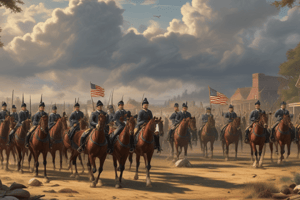Podcast
Questions and Answers
Which amendments were passed during Reconstruction?
Which amendments were passed during Reconstruction?
- Sixteenth, Seventeenth, and Eighteenth
- Thirteenth, Fourteenth, and Fifteenth (correct)
- First, Second, and Third
- Nineteenth, Twentieth, and Twenty-first
Who played a significant role in pushing for radical transformation during Reconstruction?
Who played a significant role in pushing for radical transformation during Reconstruction?
- Abraham Lincoln
- Thaddeus Stevens (correct)
- Andrew Johnson
- Ulysses S. Grant
What was the purpose of the Civil Rights Act of 1866?
What was the purpose of the Civil Rights Act of 1866?
- To protect voting rights for African Americans (correct)
- To establish segregation laws
- To promote economic development
- To grant citizenship only to white Americans
What did Reconstruction seek to achieve?
What did Reconstruction seek to achieve?
What did the forces immediately after Reconstruction seek to do?
What did the forces immediately after Reconstruction seek to do?
Flashcards are hidden until you start studying
Study Notes
Reconstruction Amendments
- The 13th Amendment (1865) abolished slavery in the United States.
- The 14th Amendment (1868) granted citizenship to former slaves and guaranteed equal protection under the law.
- The 15th Amendment (1870) granted voting rights to African American men.
Radical Republicans
- Radical Republicans, led by Thaddeus Stevens and Charles Sumner, played a significant role in pushing for radical transformation during Reconstruction.
Civil Rights Act of 1866
- The purpose of the Civil Rights Act of 1866 was to establish the citizenship of former slaves and guarantee their civil rights.
Reconstruction Goals
- Reconstruction sought to achieve the rebuilding of the South, the establishment of new state governments, and the granting of civil rights to former slaves.
Post-Reconstruction Era
- Forces immediately after Reconstruction, such as white supremacist groups, sought to undo the gains of Reconstruction and impose racial segregation and discrimination through Jim Crow laws.
Studying That Suits You
Use AI to generate personalized quizzes and flashcards to suit your learning preferences.




